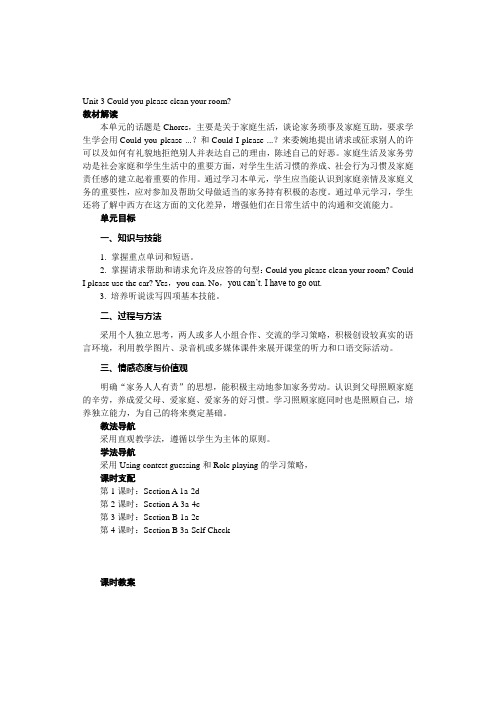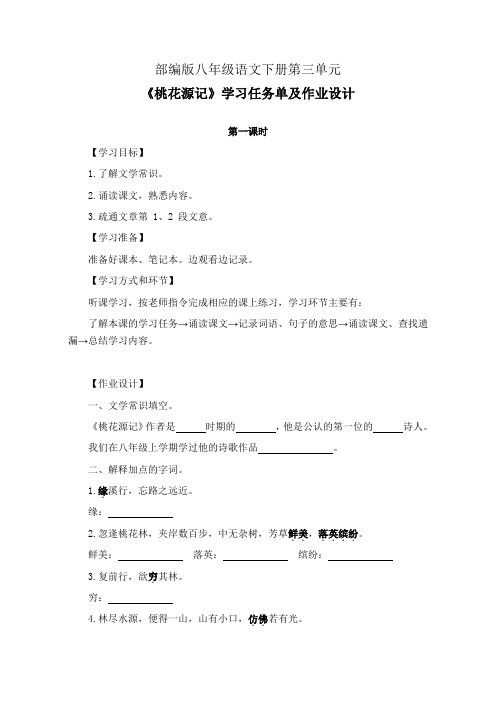八年级下册-第三单元-第三课时教案
部编版英语八年级下册教学设计Unit3第三单元教案

教学重点
1Learn to make a polite request and ask for permission.
2.进行口语训练,提高口语能力。
教学难点
进行口语训练,提高口语能力
教学用具
电脑白板
教学方法(学习方法)
pair worklistening
教学过程
Step 1learnnew words:
Step 7 Homework
1.List all the main phrases of doing chores that you know.
2.Make a conversation between you and your mother, using the sentence pattern“Could you please…?
Sorry,I can't.I am doing...
Step 4 Listening
Ask students to finish 1b 2a and 2b.
Step 5 Practice
Make conversations using the information in 2a and 2b
A: Could I use your computer?
2.My mom came over as soon as I sat down infront of the TV.
3.You’re tired, but I’m tired,too.
3c. Decide whether the underlined words in the sentences are verbs or nouns. Then wrie another sentence using the underlined word in the other form.
八年级下册英语第三单元教案

八年级下册英语第三单元教案教案标题:Exploring Cultures教学目标:1. 通过本单元的学习,学生将能够了解不同国家和文化的差异。
2. 学生将能够运用所学的知识和技能,进行跨文化交流和交流。
教学重点:1. 学习和掌握有关不同国家和文化的词汇和表达方式。
2. 学会用英语描述和比较不同国家和文化的特点。
3. 培养学生的跨文化交流能力和意识。
教学资源:1. 教科书《英语八年级下册》2. 多媒体设备3. 课件和图片教学准备:1. 准备多媒体设备,确保教学过程中的展示和演示。
2. 准备相关图片和课件,以便于学生对不同国家和文化进行比较和讨论。
教学过程:Step 1: Warm-up (5 minutes)1. Greet the students and have a brief conversation about their favorite countries or cultures.2. Show pictures of different countries and ask students to guess their names and share their knowledge about these countries.Step 2: Introducing Vocabulary (10 minutes)1. Present new vocabulary related to countries and cultures using flashcards or PowerPoint slides.2. Teach students how to pronounce and use the new words in sentences.3. Engage students in vocabulary activities such as matching exercises or word association games.Step 3: Reading and Comprehension (15 minutes)1. Have students read the text about a specific country or culture in their textbook.2. Ask comprehension questions to check their understanding of the text.3. Encourage students to discuss their thoughts and opinions about the country or culture mentioned in the text.Step 4: Comparative Analysis (15 minutes)1. Divide the class into small groups and assign each group a different country or culture to research.2. Instruct the groups to gather information about their assigned country or culture, focusing on its traditions, customs, and food.3. Have each group present their findings to the class, highlighting the similarities and differences between their assigned country or culture and the one mentioned in the textbook.Step 5: Speaking Activity (10 minutes)1. Ask students to work in pairs and discuss the following questions:- What aspects of a culture do you find most interesting?- Have you ever experienced a different culture? How was it?- How do you think cultural differences can enrich our lives?2. Encourage students to use the vocabulary and expressions learned during the lesson in their discussions.Step 6: Wrap-up and Extension (5 minutes)1. Summarize the key points of the lesson and emphasize the importance of cultural understanding and respect.2. Assign a homework task that requires students to research and present on a culture of their choice.3. Provide additional resources, such as online articles or videos, for studentswho are interested in exploring different cultures further.教学评估:1. 观察学生在课堂上的参与度和表现,包括词汇的正确使用和对不同国家和文化的理解。
人教版八年级英语下册第三单元教案

Unit 3 Could you please clean your room?教材解读本单元的话题是Chores,主要是关于家庭生活,谈论家务琐事及家庭互助,要求学生学会用Could you please ...?和Could I please ...?来委婉地提出请求或征求别人的许可以及如何有礼貌地拒绝别人并表达自己的理由,陈述自己的好恶。
家庭生活及家务劳动是社会家庭和学生生活中的重要方面,对学生生活习惯的养成、社会行为习惯及家庭责任感的建立起着重要的作用。
通过学习本单元,学生应当能认识到家庭亲情及家庭义务的重要性,应对参加及帮助父母做适当的家务持有积极的态度。
通过单元学习,学生还将了解中西方在这方面的文化差异,增强他们在日常生活中的沟通和交流能力。
单元目标一、知识与技能1. 掌握重点单词和短语。
2. 掌握请求帮助和请求允许及应答的句型:Could you please clean your room? CouldI please use the car? Yes,you can. No,you can’t. I have to go out.3. 培养听说读写四项基本技能。
二、过程与方法采用个人独立思考,两人或多人小组合作、交流的学习策略,积极创设较真实的语言环境,利用教学图片、录音机或多媒体课件来展开课堂的听力和口语交际活动。
三、情感态度与价值观明确“家务人人有责”的思想,能积极主动地参加家务劳动。
认识到父母照顾家庭的辛劳,养成爱父母、爱家庭、爱家务的好习惯。
学习照顾家庭同时也是照顾自己,培养独立能力,为自己的将来奠定基础。
教法导航采用直观教学法,遵循以学生为主体的原则。
学法导航采用Using contest guessing和Role playing的学习策略,课时支配第1课时:Section A 1a-2d第2课时:Section A 3a-4c第3课时:Section B 1a-2e第4课时:Section B 3a-Self Check课时教案第1课时Section A 1a-2c教学目标一、知识与技能1. 掌握重点词汇和短语:do the dishes,take out the rubbish,fold your clothes,sweep the floor,make your bed,clean the living room2. 理解并掌握重点句型:Could you please…? Could I …?3. 能听懂有关做家务和日常活动的对话。
人教版八年级下册第三单元《E弦上的咏叹调》精品教案

人教版八年级下册第三单元《E弦上的咏叹调》精品教案教材分析本单元的教材主要围绕音乐领域展开,通过讲述许多音乐家的故事来激发学生对音乐的兴趣。
教材分为以下几个部分:1. 音乐家的故事:介绍了许多著名音乐家的生平和成就,如贝多芬、肖邦等。
2. 音乐作品的赏析:选取了一些经典的音乐作品,通过欣赏和分析,帮助学生了解不同作曲家的风格和音乐特点。
3. 乐器演奏和研究:介绍了一些常见的乐器,如钢琴、小提琴等,并研究了一些基本的乐器演奏技巧和乐谱阅读方法。
教学目标通过研究本单元,学生应能够达到以下几个方面的教学目标:1. 了解著名音乐家的生平和成就,培养对音乐的欣赏能力。
2. 通过欣赏和分析音乐作品,研究音乐鉴赏的基本方法。
3. 了解常见的乐器和乐器演奏技巧,培养对乐器演奏的兴趣。
4. 研究基本的乐谱阅读方法,能够演奏简单的乐曲。
教学重点和难点本单元的教学重点和难点主要包括:1. 研究音乐作品的鉴赏方法,培养对音乐的感知和理解能力。
2. 研究乐器演奏技巧,如弹奏钢琴、小提琴等。
3. 研究乐谱的阅读方法,理解乐谱上的音符、节拍符号等。
教学过程第一课时:音乐家的故事1. 导入:通过播放一段著名音乐家的音乐,引起学生对音乐的兴趣。
2. 研究内容:讲解一位著名音乐家的生平和作品,帮助学生了解他们的音乐成就。
3. 拓展活动:让学生自由选择一个著名音乐家,进行研究和报告,分享给同学。
第二课时:音乐作品的赏析1. 导入:播放一首经典的音乐作品,引起学生对音乐作品的兴趣。
2. 研究内容:欣赏和分析选定的音乐作品,了解作曲家的音乐风格和特点。
3. 拓展活动:让学生选择一首自己喜欢的音乐作品,进行分享和评论,并向同学介绍。
第三课时:乐器演奏和研究1. 导入:展示一些常见的乐器图片,引起学生对乐器的兴趣。
2. 研究内容:介绍不同乐器的特点,并研究其中一种乐器的基本演奏技巧。
3. 拓展活动:让学生选择一种自己感兴趣的乐器,进行初步的研究和演奏尝试。
人教版初中八年级英语下册第三单元Unit 3 教案含教学反思

Section A 单词rubbish n.垃圾;废弃物fold v.折叠;对折sweep v.(swept)扫;打扫floor n.地板mess n.杂乱;不整洁throw v.(threw)扔;掷neither adv.也不; pron.两者都不shirt n.衬衫pass v.给;递;走过;通过borrow v.借;借用lend v.(lent)借给;借出finger n.手指hate v.厌恶;讨厌while conj.与……同时;当……的时候;而;然而chore n.杂务;乏味无聊的工作snack n.点心;小吃;快餐短语take out the rubbish 倒垃圾all the time频繁;反复as soon as 一……就……句型1.Peter,could you please take out the rubbish? 彼得,你能把垃圾倒了吗?2.And she won’t be happy if she sees this mess.而且如果她看到这么乱,她会不高兴的。
3.Could I at least finish watching this show?至少等我看完这个节目可以吗?4.For one week, she did not do any housework and neither did I.在—周时间里,她没有做任何家务,我也没有做。
that everyone should do their part in keeping it clean and tidy.既然他们和父母生活在同一所房子里,他们就应该知道每个人都应该为保持房屋的干净和整洁尽一份力。
5.The earlier kids learn to be independent,the better it is for theirfuture.孩子们越早学会独立,对他们的未来就越好。
语法情态动词could的用法掌握本单元中的重点词汇及相关短语,并灵活运用。
人教版初中八年级英语下册第三单元Unit3教案含教学反思

⼈教版初中⼋年级英语下册第三单元Unit3教案含教学反思Section A 单词rubbish n.垃圾;废弃物fold v.折叠;对折sweep v.(swept)扫;打扫floor n.地板mess n.杂乱;不整洁throw v.(threw)扔;掷neither adv.也不; pron.两者都不shirt n.衬衫pass v.给;递;⾛过;通过borrow v.借;借⽤lend v.(lent)借给;借出finger n.⼿指hate v.厌恶;讨厌while conj.与……同时;当……的时候;⽽;然⽽chore n.杂务;乏味⽆聊的⼯作snack n.点⼼;⼩吃;快餐短语take out the rubbish 倒垃圾all the time频繁;反复as soon as ⼀……就……句型1.Peter,could you please take out the rubbish? 彼得,你能把垃圾倒了吗?2.And she won’t be happy if she sees this mess.⽽且如果她看到这么乱,她会不⾼兴的。
3.Could I at least finish watching this show?⾄少等我看完这个节⽬可以吗?4.For one week, she did not do any housework and neither did I.在—周时间⾥,她没有做任何家务,我也没有做。
that everyone should do their part in keeping it clean and tidy.既然他们和⽗母⽣活在同⼀所房⼦⾥,他们就应该知道每个⼈都应该为保持房屋的⼲净和整洁尽⼀份⼒。
5.The earlier kids learn to be independent,the better it is for their future.孩⼦们越早学会独⽴,对他们的未来就越好。
初中物理教科版八年级下册第三单元第3课《连通器》优质课公开课教案教师资格证面试试讲教案

初中物理教科版八年级下册第三单元第3课《连通器》优质课公开课教案教师资格证面试试讲教案
初中物理教科版八年级下册第三单元第3课《连通器》优质课公开课教案教师资格证面试试讲教案
1教学目标
认识连通器,知道船闸的工作原理,能用连通器原理解释一些简单的实际问题。
2学情分析
经历用“叶片模型”推导出连通器原理的过程,使学生体会建立模型是物理学研究方法之一。
分析日常生活中应用连通器的事例,培养学生运用知识的能力和将物理知识主动运用于生活生产的意识。
3重点难点
连通器原理及其运用是本节重点。
经历用“叶片模型”推导出连通器原理的过程是本节难点。
4教学过程
4.1第一学时
4.1.1教学活动
活动1【活动】连通器和船闸
1、实验探究:连通器有什么特点。
①三峡大坝拦腰截断长江,为什么下游船只能驶到上游?它们是怎样翻越大坝的?由此引出连通器概念。
②用胶管把两个注射器头连接起来,让学生认识最简单的连通器。
③移动其中一个注射器筒,使它升高、降低、倾斜,观察:水流动时流动方向有什么特点;静止时两管中水面情况。
④分析实验现象,学生用自己的语言概括连通器原理。
2、讨论交流:船闸怎样工作。
船闸是一个“运用小道理解决大问题”的突出事例,用挂图、实物模型、影视材料,结合书上数据使学生开阔眼界,充分调动学生思维。
部编版八年级语文下册第三单元《桃花源记》第1-3课时学习任务单(公开课导学案)及作业设计

部编版八年级语文下册第三单元《桃花源记》学习任务单及作业设计第一课时【学习目标】1.了解文学常识。
2.诵读课文,熟悉内容。
3.疏通文章第 1、2 段文意。
【学习准备】准备好课本、笔记本。
边观看边记录。
【学习方式和环节】听课学习,按老师指令完成相应的课上练习,学习环节主要有:了解本课的学习任务→诵读课文→记录词语、句子的意思→诵读课文、查找遗漏→总结学习内容。
【作业设计】一、文学常识填空。
《桃花源记》作者是时期的,他是公认的第一位的诗人。
我们在八年级上学期学过他的诗歌作品。
二、解释加点的字词。
1.缘.溪行,忘路之远近。
缘:2.忽逢桃花林,夹岸数百步,中无杂树,芳草鲜美..,落英缤纷....。
鲜美:落英:缤纷:3.复前行,欲穷.其林。
穷:4.林尽水源,便得一山,山有小口,仿佛..若有光。
仿佛:5.土地平旷,屋舍俨然..,有良田美池桑竹之属.。
俨然:属:三、把下列句子翻译成现代汉语。
1.渔人甚异之____________________________________________________________2.初极狭,才通人。
复行数十步,豁然开朗。
____________________________________________________________3.阡陌交通,鸡犬相闻。
____________________________________________________________5. 黄发垂髫,并怡然自乐。
____________________________________________________________【参考答案】一、东晋陶渊明田园《饮酒》(其五)二、1. 缘:沿着2.鲜美:新鲜美好落英:落花缤纷:繁多的样子3.穷:尽4.仿佛:隐隐约约5.俨然:整齐的样子属:类三、1.渔人对此感到十分诧异。
2.起初洞口很狭窄,仅容一个人通过。
又走了几十步,突然从狭窄幽暗变得开阔敞亮。
- 1、下载文档前请自行甄别文档内容的完整性,平台不提供额外的编辑、内容补充、找答案等附加服务。
- 2、"仅部分预览"的文档,不可在线预览部分如存在完整性等问题,可反馈申请退款(可完整预览的文档不适用该条件!)。
- 3、如文档侵犯您的权益,请联系客服反馈,我们会尽快为您处理(人工客服工作时间:9:00-18:30)。
Unit 3 Could you please clean your room?
Section A 3 (Grammar focus-4c)
教学目标:
1知识与技能:
1)重点单词和词组
2)使用could 做出礼貌要求和请求许可。
2.过程与方法:通过合作探究的方法结局本课的重点知识点
3.情感态度与价值:学会照顾自己,培养自己的独立意识。
教学重点:
谈论做家务的词汇,情态动词could的使用方法。
教学难点:
灵活运用礼貌的方式表达请求和允许
Step 1 Revision
根据所学内容,写出下列短语。
fold one’s clothes, do the dishes, use one’s computer, take out the rubbish
make the bed, sweep the floor, stay out late, be angry with sb., take sb. for a walk clean the living room, work on, come over, do the housework, get a ride
Step 2 Presentation
阅读下列句子,观察问句的用法及回答。
Step 3 Grammar
Could you(please)+ V-原形?表示委婉地提出请求
1. Could you please clean your room?
Yes, sure. / Of course./ Certainly./All right.
2. Could you please do the dishes?
Sorry, I can’t. I have to do my homework.
在表示请求帮助或请求允许的疑问句中,常用could代替can,以表示礼貌,委婉或不确定的语气,而can则不具备这些语气。
这种情况下不能把could看作can 的过去式。
以上两句中用could是为了表示礼貌的请求。
表示请求帮助或请求允许时,除了can, could之外,还可以用may,句子的表达方式也各有不同,可以用不同的方式来表示同一个概念。
例:
①Could/Can/May I use your car for a day?
②I wonder if I could use your car for a day?
对于①、②句所作允答可以各种各样,如同意可以说Yes或Sure或Certainly,还可说Yes, (do) please. 或Of course. (you may/can). 或Go ahead, please. 或That’s OK/all right; 如果不同意,可以说I’m sorry you can’t. 或I’m really sorry, but I have to use it today. 要避免说No, you can’t. 这样显得很不礼貌。
否定回答通常用委婉语气。
③Do you mind if I use your car for a day?
对于句③所作回答可以说Never mind. /Not at all. 表“不介意”。
不能用Yes. /Sure. /Of course. /Certainly.等。
无论肯定还是否定应答中,要避免使用could,要用can 或may。
因为应答须用确定的语气。
而could在表请求的问句中是为了表示礼貌或委婉语气,用在应答中则成了不确定语气,与情理不符。
所以应答中不说Yes, you could. 或No, you couldn’t. 而要说Yes, you can. 或Sorry. /No, you can’t. —Could I please use your computer?
—Sorry, I’m going to work on it now.
—Well, could I watch TV?
—Yes, you can.
Could I/you please …?表示一种有礼貌的请求或提议,其后连接原形动词,比Can you /I…?语气更委婉。
类似句型有:
Would you like + sth. / to do sth.?
May I + do sth.?
Shall we + do sth.?
Would you mind + sth. /doing sth.?
What / How about + sth. /doing sth.?
肯定回答有Sure. /Of course. / Certainly. /OK. /Great. / Well. / Good idea. / I agree. 等。
否定回答有Sorry… / No, you can’t. 等。
Step 4 Practice
Make up dialogues using the sentences in Grammar Focus with your partner.
A: Could you please take the dog for a walk?
B: OK, but I want to watch one show first.
4a Write R for requests and P for permission. Then match each one with the correct response.
1. ___ Could I hang out with my friends after the movies?
出去玩
2. ___ Could you please pass me the salt?
3. ___ Could I borrow that book?
4. ___ Could you help me do the dishes?
5. ___ Could you lend me some money?
a. Yes, here you are.
b. Hmm. How much do you need?
c. Yes, sure. No problem. I finished reading it last night.
d. Yes, but don’t come back too lat
e.
e. No, I can’t. I cut my finger and I'm trying not to get it wet.
Note:
borrow和lend
borrow和lend都有“借”的意思,但它们的含义和用法有所不同。
★borrow表示“借入”,即把本来不属于自己的东西借来暂时使用,常与介词from 连用。
如:
You can borrow a book from the library.
★lend表示“借出”,即把属于自己的东西借给别人暂时使用,常与介词to连用,也可以跟双宾语。
如:
He’s going to lend his bike to Tom.
You mustn’t lend others my pen.
4b Fill in the blanks in the conversation.
A: I hate to ____ chores.
B: Well, I hate some chores too, but I like other chores.
A: Really? Great! _____ I ask you to ____ me with some chores then?
B: What do you need help with?
A: ______ you please _____ my clothes for me?
B: I don’t want to do that! It’s boring!
A: OK. Then ______ you ______ do the dishes for me?
B: Sure, no problem. But _____ we go to the movies after that?
A: Sure. I’ll finish my homework while you help me with the dishes. Then we can go to the movies.
Step 5 Discussion
If we are having a camping trip, what should we do before the trip?
Step 6 Homework
Write a letter to your friend to ask him/her to take care of your house when you are on vacation.
Teaching design
Post-teaching。
